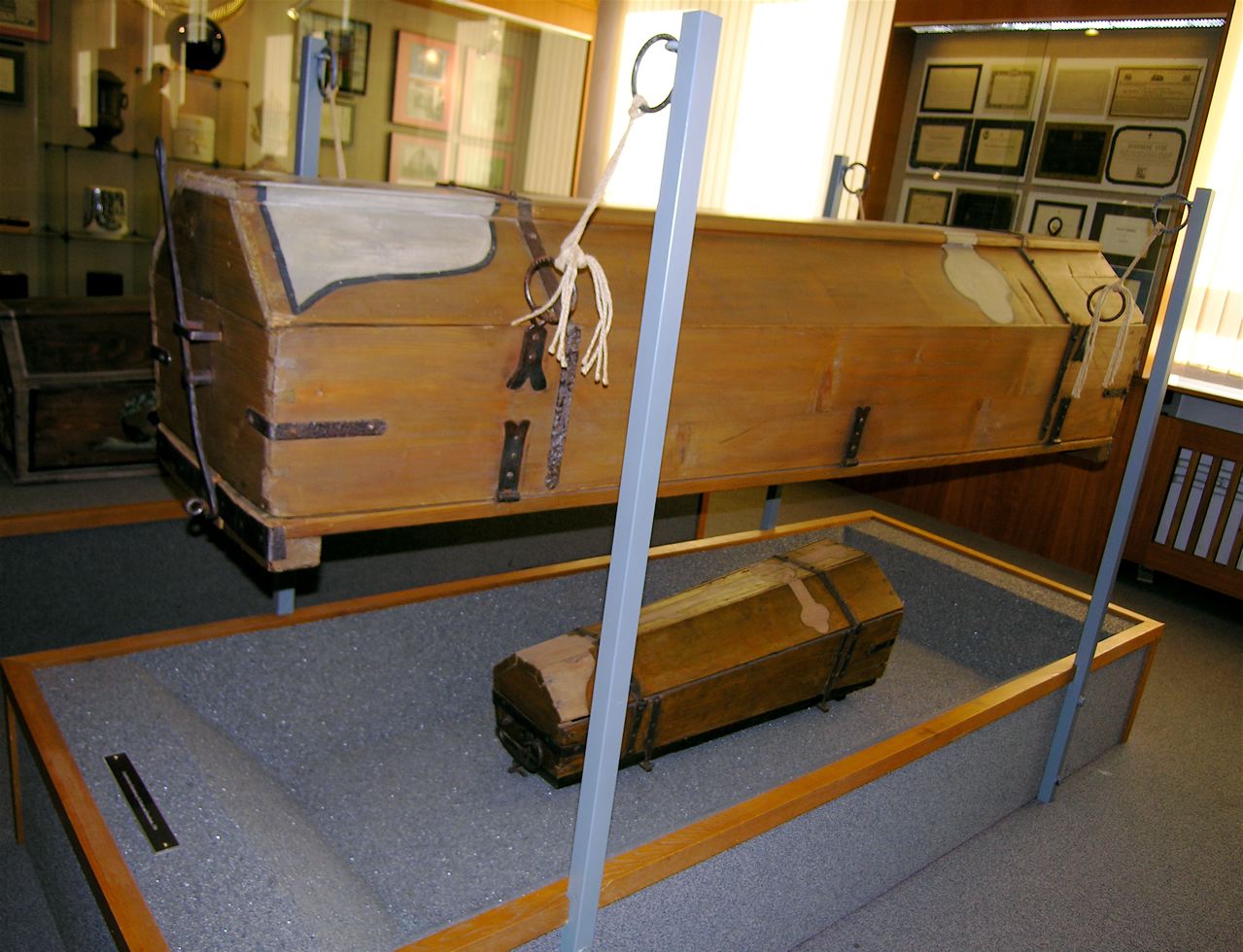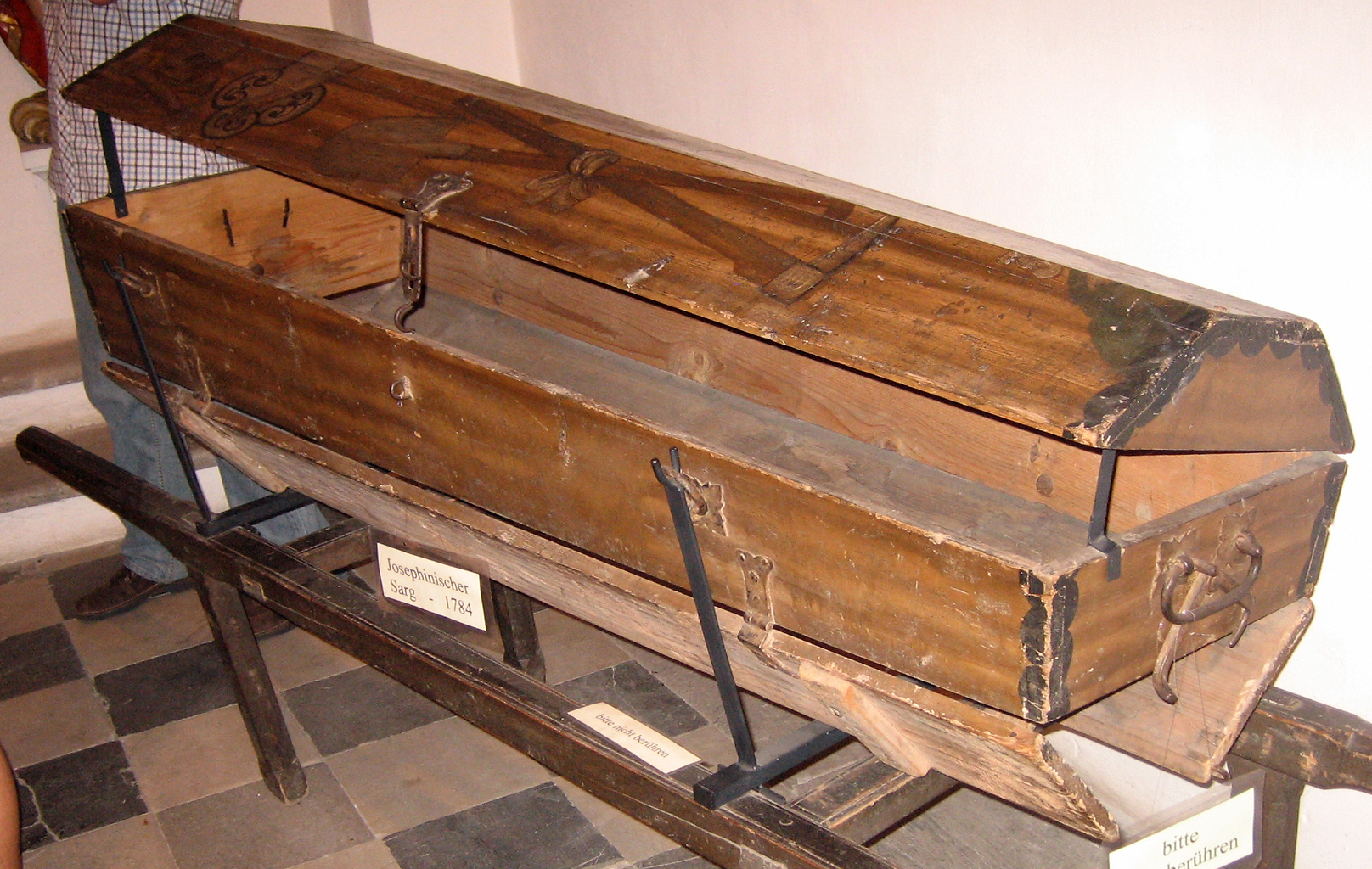Economy Coffin on:
[Wikipedia]
[Google]
[Amazon]

 The economy coffin, hinged coffin or Josephinian coffin (, , or ) was a type of reusable coffin introduced by
The economy coffin, hinged coffin or Josephinian coffin (, , or ) was a type of reusable coffin introduced by

Joseph II, Holy Roman Emperor
Joseph II (13 March 1741 – 20 February 1790) was Holy Roman Emperor from 18 August 1765 and sole ruler of the Habsburg monarchy from 29 November 1780 until his death. He was the eldest son of Empress Maria Theresa and her husband, Francis I, ...
in the late 18th century. The body was carried in the coffin to the gravesite where it would be dropped into the grave through folding doors on the base. The coffin would then be reused.
Background
Joseph II
Joseph II (13 March 1741 – 20 February 1790) was Holy Roman Emperor from 18 August 1765 and sole ruler of the Habsburg monarchy from 29 November 1780 until his death. He was the eldest son of Empress Maria Theresa and her husband, Emperor F ...
was a reforming ruler who advocated Enlightenment
Enlightenment or enlighten may refer to:
Age of Enlightenment
* Age of Enlightenment, period in Western intellectual history from the late 17th to late 18th century, centered in France but also encompassing (alphabetically by country or culture): ...
principles. He was a keen proponent of natural law
Natural law (, ) is a Philosophy, philosophical and legal theory that posits the existence of a set of inherent laws derived from nature and universal moral principles, which are discoverable through reason. In ethics, natural law theory asserts ...
and adhered less strictly to Christian dogma than his predecessors. Many of his reforms were utilitarian
In ethical philosophy, utilitarianism is a family of normative ethical theories that prescribe actions that maximize happiness and well-being for the affected individuals. In other words, utilitarian ideas encourage actions that lead to the ...
in nature and also served to extend the reach of the state.
Joseph made several decrees relating to burials, for reasons of hygiene. He introduced legally mandated periods between death and burial and required examination of the deceased by a medical professional. Joseph prohibited burials within church vaults in Vienna in 1782, requiring that burials take place outside the city boundary. He extended this decree to the whole of Austria in 1783 and the rest of the Habsburg lands in 1784. He also discouraged visits to cemeteries except for the purpose of burial.
Coffin
In August 1784, Joseph ordered that all burials would be made with reusable coffins. This would prevent what he considered to be a waste of wood. He also proclaimed that the deceased should be buried naked so that their clothes could be reused by others. Joseph also considered that the measures would allow for the quicker decomposition of the body, which he thought more hygienic and that would allow for the earlier reuse of the grave. Joseph decreed that each parish would construct sufficient economy coffins for their needs. These coffins were constructed with trapdoors in their base. The body would be placed naked into a sack and transported to the gravesite in the coffin. The coffin would be lowered into the grave and a lever operated that opened the trapdoor, allowing the body to fall to the bottom of the grave. The coffin would then be returned to the parish for reuse at future burials. Similar coffins had sometimes been used in the medieval period during times of high mortality such as plague epidemics. The coffin proved to be one of the most controversial of all Joseph's reforms, receiving considerable resistance from the general public, the church and his own government officials. Joseph withdrew the order after six months, though his other burial reforms remained in place. Joseph was himself buried in a coffin after his 1790 death, though it was of plain copper construction rather than the elaborately detailed coffins of his predecessors.References
External links
* {{commonsinline, Josephinischer Sarg, the economy coffin Coffins Burials 1784 establishments in the Habsburg monarchy 1785 disestablishments in the Habsburg monarchy